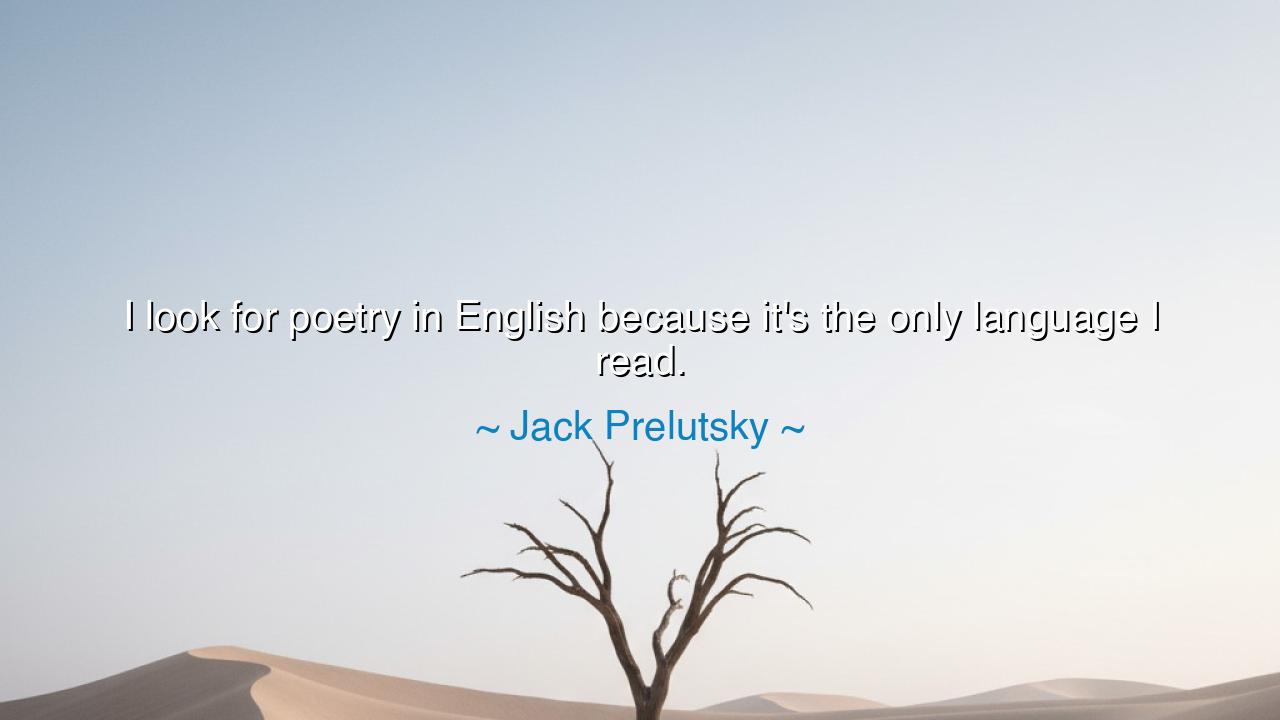
I look for poetry in English because it's the only language I






“I look for poetry in English because it’s the only language I read.” Thus speaks Jack Prelutsky, poet of whimsy and wonder, whose words, though lighthearted, conceal a truth that is both humble and profound. For in this simple admission lies a recognition of the bond between language and vision: we seek beauty in the tongue we know, for it is through that tongue that the world first reveals itself to us.
The meaning of this saying rests in the truth that every human heart seeks poetry, but always through the doorway of its own language. Prelutsky, known as the first Children’s Poet Laureate of the United States, declares his search plainly: he looks for poetry in English, not because English alone has it, but because it is the vessel he has been given, the medium through which his imagination flows. What he teaches is this: poetry is everywhere, in every tongue, but we each begin in the speech we call home.
The origin of this insight lies in the nature of poetry itself. Poetry is not bound to one people or one nation; it sings in Sanskrit hymns, in the Chinese Book of Songs, in Arabic ghazals, in Spanish ballads, and in African praise chants. Yet each reader, unless trained in many tongues, meets poetry first and most deeply in their native language. For Prelutsky, this was English. And so he testifies that though he reads only in one language, it is enough—for in it he can still find the infinite.
History gives us the story of Homer, whose epics lived in Greek, and for centuries were known only to those who understood that tongue. But when translated into Latin, then into English, German, and countless others, they still carried power. Readers who knew no Greek still found in translation the shadow of Homer’s fire. Yet those who knew the original tongue heard it most vividly. This shows us that while every language can house poetry, we each seek it first in the one language that sings in our blood.
The lesson is not one of limitation, but of encouragement. Prelutsky reminds us that you do not need to know many languages to experience the wonder of poetry. If you know only one, begin there. Do not despise the narrowness of your reading; within a single tongue lies a universe. English alone contains Shakespeare and Dickinson, Hughes and Frost, Angelou and Eliot. To read deeply in one language is to dive into endless seas of imagination.
Yet there is also a call to humility here. We should remember that our own language is not the whole world. Others too have their epics, their songs, their revelations, in tongues we do not know. We may honor these by translation, by openness, by recognizing that what we call poetry is one branch of a vast and eternal tree. Prelutsky’s confession is both a comfort—that one language is enough—and a challenge—that the human hunger for poetry is larger than any single tongue.
Thus the teaching endures: seek poetry wherever you are, in the language you know, for it is through that language that the creator of words has given you sight. And if your eyes fall upon translations, honor them too, knowing that every tongue holds its treasures. Prelutsky’s voice reminds us that to begin with what we have is enough. For in one language faithfully explored, we may find not only beauty, but eternity itself.






H7Ho Thai Ngoc Han 7/2
Prelutsky’s focus on English poetry brings to mind the idea that language deeply influences how we connect with poetry. If we read poetry only in our native language, are we limiting the emotional and cultural richness that could be found in poetry from other languages? How much does a poet’s understanding of the world expand when they engage with poetry across multiple languages and cultures?
HTPhan Hoai Thu
This quote speaks to how our literary preferences are often shaped by the languages we know. If English is the only language Prelutsky reads poetry in, does that mean he feels confined to English poetry? Could reading poetry in other languages deepen his connection to the art form, or is there something uniquely rich about the poetry found in the language we most identify with?
HDHuy Dinh
I find Prelutsky’s comment intriguing because it raises a question about cultural boundaries in literature. If one looks for poetry only in English, are they potentially closing themselves off from the rich variety of poetic traditions in other languages? Could exploring poetry in other languages enhance one's understanding of the art form, or is it possible to be just as moved and inspired by poetry in one's own native tongue?
RDTAN VUONG ( RO DEPTRAI)
This quote is interesting because it suggests that Prelutsky’s engagement with poetry is deeply rooted in the English language. But does this limit his experience of poetry? Are there unique qualities in poetry written in other languages that can’t be fully captured in English? How much of the essence of a poem is tied to the language in which it is written, and how much transcends that?
Hhung
Prelutsky’s quote makes me think about how language shapes our experience of poetry. If English is the only language he reads, does that mean his sense of what poetry is can only be understood through the lens of that language? What happens if a poet doesn’t read poetry in multiple languages? Can they miss out on certain forms, styles, or nuances that would broaden their creative scope?